BAKING MATTERS
Kneading French flair and sourdough in Durban
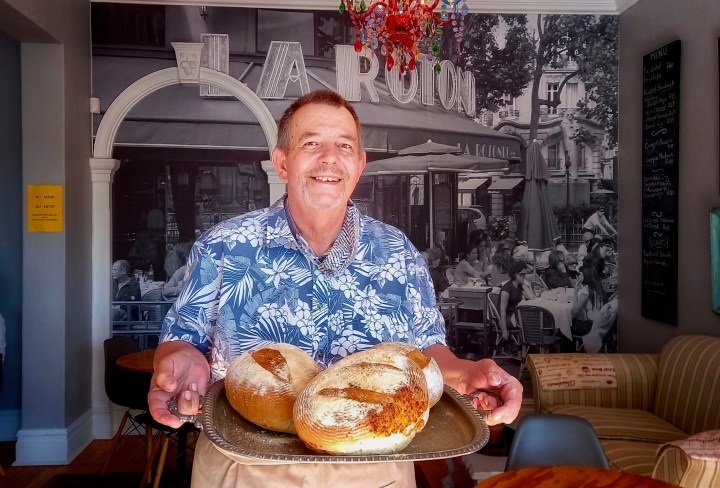
Peter Venter is a whole lot more than a baker. He is part of the fabric and history of Durban’s culinary past – and present. A breath of French air. Then there’s the surprise element.
The author supports Food Forward SA, committed to a South Africa without hunger. Please support them here.
Peter Venter was sweet 16 the first time a mille-feuille French-kissed him on the taste buds. He was with his parents in Paris. His singular encounter with the classic crispy-creamy French custard slice took place at the iconic Café de la Rotonde. Founded in 1911, in its heyday the Montparnasse brasserie was the bohemian hangout of the likes of Picasso and Modigliani. Also of innumerable “starving artists” – writers included – who would sit there for hours nursing a 10-centime cup of coffee.
Different place, different time, add laptop and WiFi: pretty much just as I am doing right now.
Thanks to a confluence of events starting with that magical mille-feuille and including some hectic challenges – which, when you probe the surprise twists and turns of the modest baker’s life-to-date, he seems to thrive on in the best of times and deal with at their worst – Durban now has its own version of Café de la Rotonde.
Venter, it transpires, visited Paris nine times as a teenager.
His dad, back then, had been appointed as a military attaché to Paris. The teenager and two of his three sisters were left with their grandparents at Reddersburg, a farming town in the Free State.
“My baby sister was with my parents in Paris. The three of us older kids went there during school holidays.”
Does he remember much?
“Everything!” he says.
“Every place we visited. Everything I ate. Everything we did.”
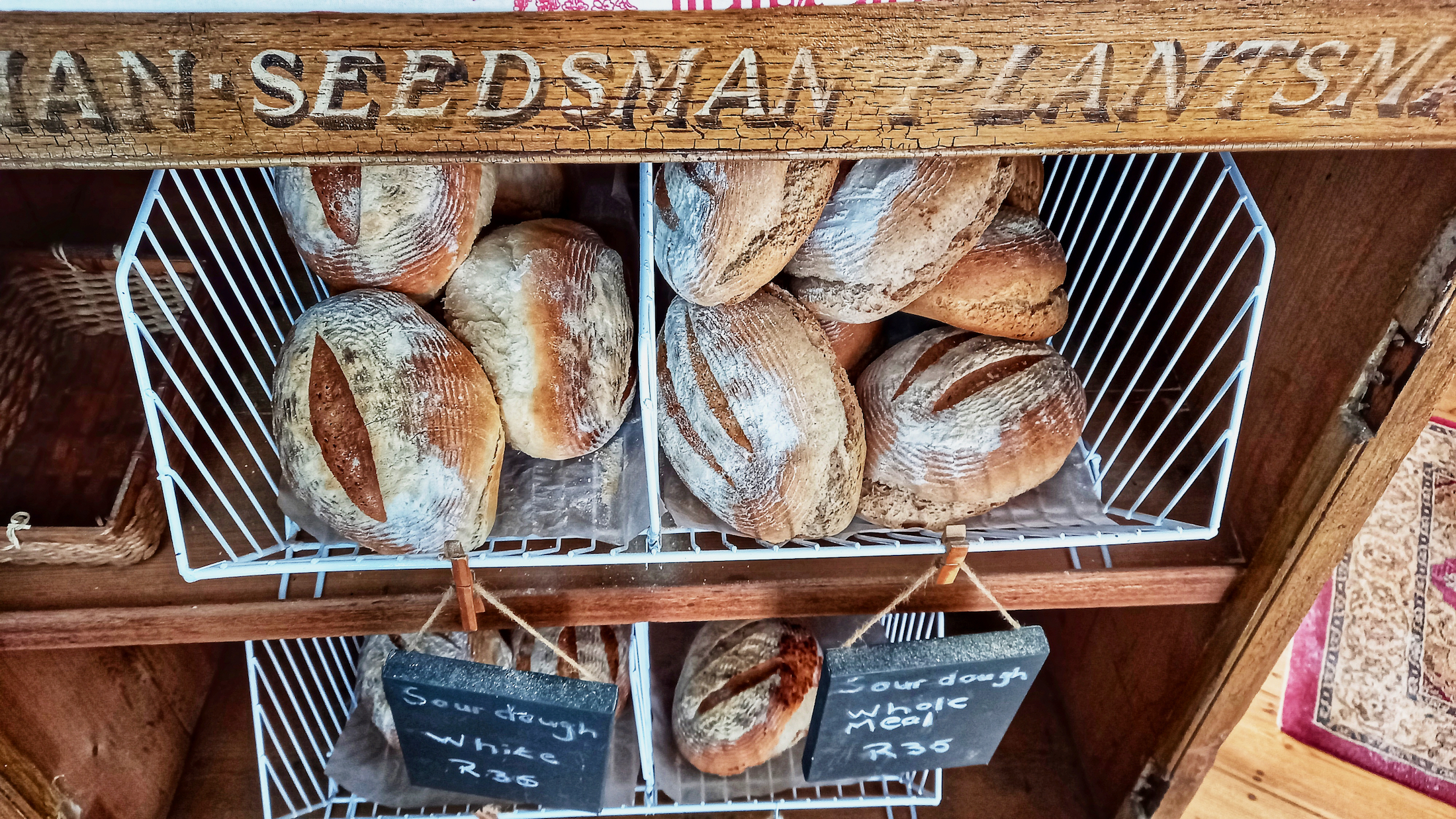
Assorted sourdough loaves ready to take home. (Photo: Wanda Hennig)
“So do you consider yourself a Francophile?” I ask Venter.
We’re sitting in his lower Morningside bakery-bistro. It is kitty-corner across Lillian Ngoyi Road from the tiny boulangerie he opened and built up, over three-plus years, pre-Covid. Where I would stop off for a loaf of sourdough and a chat and sometimes fresh farm eggs when I was on that side of Durban.
From where he was given two-weeks notice at the start of Covid. Had to have a lawyer intervene. Get him an extension.
His new place is larger, loftier. Literally a corner bakery downstairs in a double-storey. One of his regulars, when Venter was given notice, knew the 1903 house had been recently purchased by an entrepreneur investor. Would Venter be interested in relocating there? Lucky for him, lucky for his sourdough-loving fans, lucky for the neighbourhood, in October 2020 he moved into the new space, where he’d been invited to collaborate on both décor and set-up with the new owner’s interior designer.
The defining feature is a black and white image of Café de la Rotonde. It wallpapers an entire wall. There are other photos and posters too. All French-themed.
Venter’s “uniform” when he greets customers, kneads dough, fashions his loaves and makes what he has branded his “perfect pies”, is a long chef’s apron that I imagine a waiter at la Rotonde might have worn at the time of that first mille-feuille.
He called his place Bread the Artisan Bakery when it was across the street. He has added “bistro” to the name now that he has a bigger kitchen and more space.

The art of the good cappuccino from barista Gugu Magugu. (Photo: Wanda Hennig)
He has also added a proper espresso machine and a first-rate barista: Gugu Magugu, who has done the rounds of some of Durban’s top coffee establishments.
“I was using the same Coffee Merchant coffee when across the road,” he says.
“An Ethiopian and Ugandan blend,” Magugu shares.
The couple of times I ordered it in his old place, it never tasted as it does now. Creamy and rounded.
“The difference is, I was making it then,” Venter shrugs. Chuckles.
“So,” he muses, getting back to my question, “it seems I must be a Francophile. I never thought about it before but a lot of what’s in here is French. And at home, too…” Home being a few blocks away, where he lives with his wife of 30-plus years, Lucy. “All French,” he says.
And yes, he loves “real proper authentic French food” from boeuf bourguignon to bouillabaisse and coq au vin to rabbit in red wine and cassoulet. The boeuf bourguignon, when the mood takes him, he offers as a special on his bistro menu.
“And yes, I would say Paris most certainly shaped my passion for cooking and for food.”
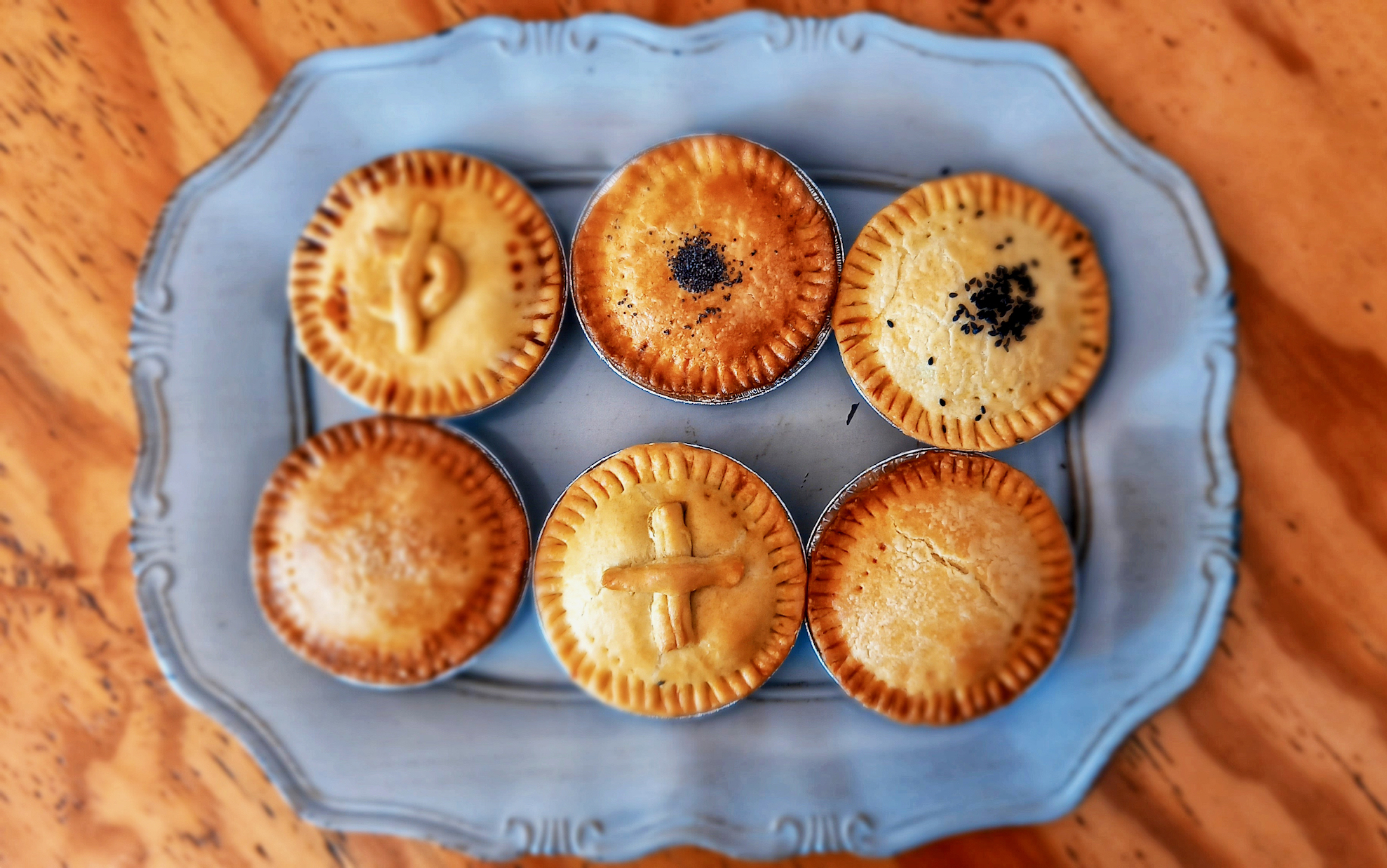
Assorted ‘perfect pies’ with fillings that reflect the pieman’s journey. (Photo: Wanda Hennig)
Surprisingly, though, it was in Pretoria, not Paris, that he got his hands-on training and French-cooking immersion. (Then there’s the Parys story, which we’ll get to just now.)
After completing his final two years of high school, in Pretoria, instead of waiting to be called up for compulsory military service “and the prospect of the artillery division or whatever”, he thought, “let me rather start the career I’m interested in. If you joined the permanent force, the Air Force back then had this option where you could train as a chef”.
His qualification came from the International Hotel School in Pretoria. “There were modules you attended at the school. The rest of the time was the practical part. Cooking. Meal planning. Prepping. All done in the Air Force kitchen.”
Air Force commitments completed, his first job was at the Arcadia Hotel in Pretoria.
“At the time they had a proper authentic French restaurant. It was run by a Belgian man, a Monsieur Hulet, who had come to Pretoria via the Belgian Congo (now the Democratic Republic of the Congo) where he’d had a coffee plantation. All cooking basics come from French cooking, so I’d had some training at hotel school. But in the kitchen with Monsieur Hulet, we worked side-by-side, he was passionate and precise, he taught me: everything.”
So for instance, “my tarragon chicken pies and my duck and orange pies”, the ones he has on his bistro menu for eating in and his bakery menu for taking home, “they both come from that time”.
He recalls relishing the challenges, the one-on-one experience, the cuisine. “But after about three years he passed away and they closed the restaurant.”
Venter’s next job of note was at a restaurant called Gourmet 2000, which had German, Swiss and Austrian owners. “Very continental. A lot of German cooking.” He was front-of-house manager there. The recipe for the filling in his “smoked chicken with apple” pie, another standard on the menu, comes from that time.

The humble foodie. Peter Venter has lots to trumpet on about but doesn’t. (Photo: Wanda Hennig)
It was after working at a franchise “a frustrating time, the routine and restrictions, but part of the learning curve and another challenge” that he and Lucy, who he met in Pretoria, ended up in Durban. Where he would become part of the fabric and history of the city’s culinary past; sure to evoke memories in those of us of a certain – variable – age who lived, worked, were students, had dalliances, in the city in the late ’60s, the ’70s, through the ’80s.
The Tropicale in Albert Park, for instance. He was there for seven years, in the kitchen, cooking and managing. “A roadhouse and family restaurant,” he calls it. “Curries, the oxtail, the pecan nut pie…”
The “roadhouse” part being where we’d go late-night and order bacon and banana toasted sandwiches. Or was it peanut butter, bacon and banana? As a boarding school survivor (if you were at one, you’ll know what I mean – if not, think concoctions and creativity to survive the bland and unappetising, occasionally with weevils) a treat either way. Oh, and those double-thick malted Horlicks milkshakes. Why no more? Orders brought on a tray that was hooked on the car window. I Google and find a “Durban Down Memory Lane” Facebook post about the Tropicale (not the only one) with 619 likes, 195 comments and 30 shares.
Then there was the original Bread Ahead, which I find on the same “memory lane” Facebook link. This one with 303 likes. Venter was there when they opened. And bakery manager for four years. Think pies with made-from-scratch pastry. Bread, warm and crusty and irresistible. And those Portuguese rolls…
Next there was Greyville Race Course where he was executive non-race-day chef. Cooking. Managing. Doing exactly what the title suggests: special events, weddings, functions, shows – happenings; working with the city’s movers and shakers of the time. “Mainly one was doing buffets, but you could elaborate a lot.”
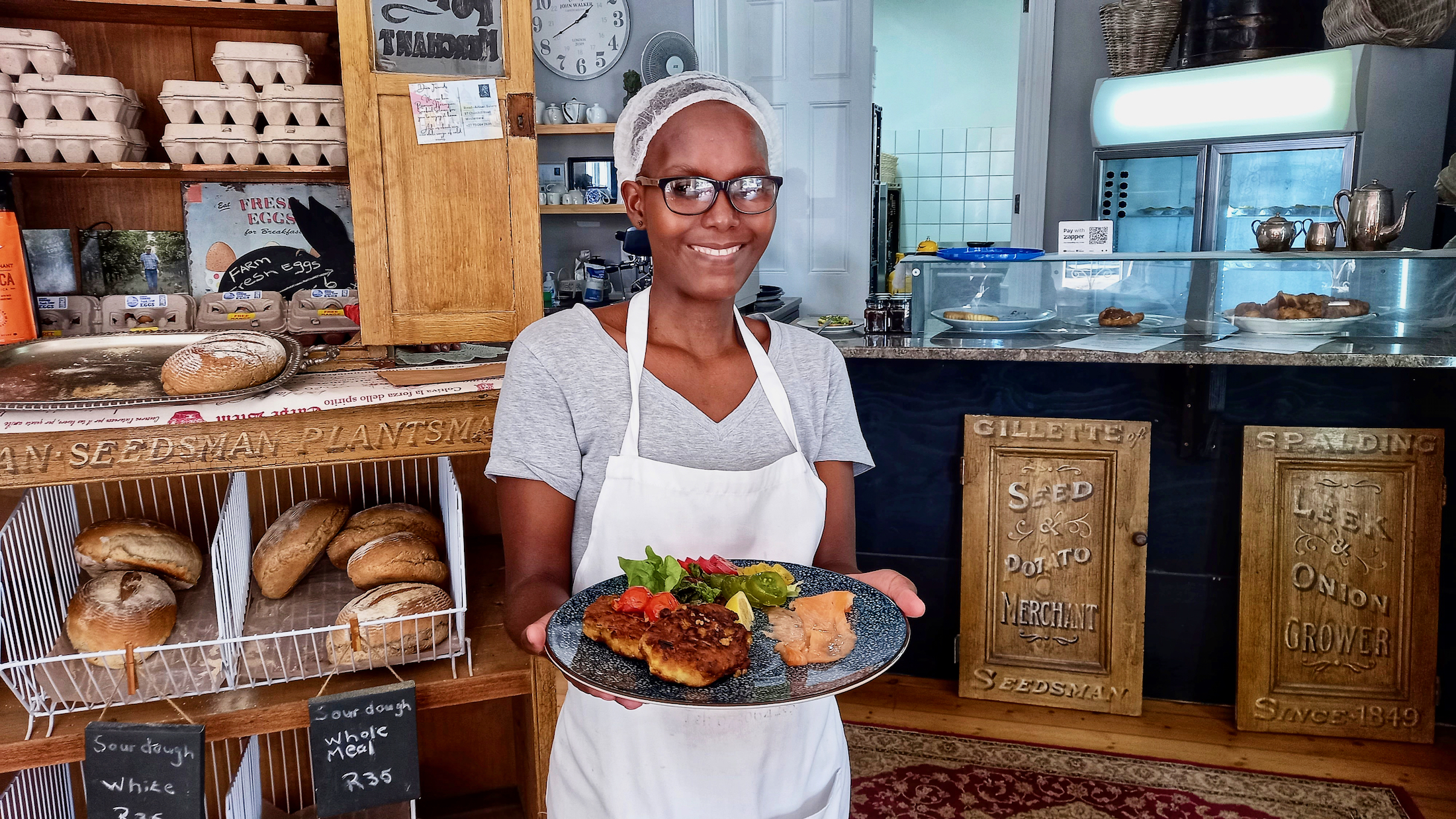
Zama Makhathini serves up baby marrow fritters with smoked salmon. (Photo: Wanda Hennig)
Venter and I talk at a table by the window in the bakery. He suggests, for lunch, I have the menu special. Baby marrow fritters and smoked salmon. He disappears into the kitchen to give the order to Zama Makhathini, who joined him as a cleaner four years ago, showed interest and enthusiasm, and who is now his side-kick cook.
Monday to Thursday he is in the kitchen at 5am baking his weekday quota of 40 loaves. Friday to Sunday, when he bakes double the quantity, he begins at 4am. All the bread is ready and on the shelves by nine.
In true old-fashioned neighbourhood café style, he neither delivers nor sells his bread through other outlets. You want it, you arrive, you buy your loaf. “I want to be sure it’s fresh and not a day old. The only way I can do this is to limit the daily bake and sell directly from here.”
Any loaves left at the end of the day, he delivers on his way home to one of three nearby non-profits.
“Yes, I do the bread prepping and baking myself,” he says. Alone in the kitchen.
“I find it soothing. Therapeutic. It’s a slow process. Meditative.”
His sourdough selections include his ciabatta, a white loaf and a whole-wheat brown. Then there’s the rosemary sourdough, aromatic and infused with the herb, dried and crushed in a coffee grinder. There’s a sourdough run through with veins of chilli. A charcoal sourdough at weekends that is black and my favourite, not for the reputed health benefits but because it looks exotic. There’s sourdough he makes in a pan so it looks like a traditional loaf and “is excellent for sandwiches”.
He makes a rye loaf. A Lebanese spice bread. A seeded health bread.
His “perfect pies” are influenced by his culinary journey. We’ve mentioned some. The “Moroccan mince” is to come. The potato curry and the butter chicken? Well, this is Durban.

Crispy croissants: ‘You can’t beat the pros.’ (Photo: Wanda Hennig)
He’s won awards for canapés and confectionery at Unilever Chef of the Year events. But the biscuits he sells, he buys in. His stash of napolitaines (Mauritian sandwich cookies), melt-in-the-mouth shortbread sandwiched together with jam and topped with pink icing, he gets from a Mauritian friend of his landlord. The little round chocolate covered shortbread treats are from another keen home baker who delivers.
His croissants? He’s a pragmatic man. Knows his limitations. “You can’t beat the pros,” he says. He gets them frozen, imported from Belgium. A source he found online.

Fresh-baked but not by Venter: shortbread biscuits and napolitaine. (Photo: Wanda Hennig)
“I always work at a place until I can get another challenge,” Venter tells me. Sounds gung-ho. On the contrary, he is unassuming. Modest. Amused and amusing.
Full of surprises.
Think of someone who blows their own trumpet. Toots their own horn. He is the opposite. Is it a confidence thing that when you’ve done a lot, taken risks, had adventures, you can quietly get on with the next one?
At some point, there was a coffee shop in his life. At some other point he became interested in Moroccan food so tested the tagine waters at Durban’s Essenwood Market, saw people were interested, so “we started our own restaurant, called it Deja-Vu – Moroccan and North African – in half of the three-storey house we had in Queensburgh”.
It did well. Then someone made an offer and he sold. But there it is. The inspiration for his menu’s “Moroccan mince pie”.
It was some time after the Moroccan adventure that he went to work for the Diakonia Council of Churches. “I got the job via an ad in the paper. They were looking for someone to establish a catering department. I started the kitchen from scratch.”
He also set up their erstwhile café, which is where I met him. While visiting one of the departments. Surprised to find I could avail myself, inside the building, of a good cup of coffee.
He stayed on there for 13 years. “There was such a nice mix of tenants. Black Sash. Lawyers for Human Rights. Refugee Social Services. A women’s rights group…”
It was around 2014, while at Diakonia, that Venter attended a bread-making course offered by Taste magazine in Westville. The teacher was Graeme Taute, legendary for his artisanal wild yeast sourdough, sold for some years at the Karkloof Farmers’ Market.
Immediately after the class, Venter made his own sourdough starter. “A seven-day process and it’s still my foundation starter.” He also started baking sourdough bread for the Diakonia conference and events he catered.
Venter left Diakonia about five years ago when, after a change of leadership, working there became untenable.
He and Lucy decided, at that point, to move and open a bakery not in Paris but in – can we call it South Africa’s foster-child version? Parys in the Free State.
“We had this grand plan. Went there for a first look. Then for a second. We found premises with a courtyard that was suitable for a bakery and coffee shop. Found a lovely house. Booked the removal company.”
Then “one after the other, things started to fall apart. The lease arrived and it was R40,000 more than we’d been quoted. The people in the house said they didn’t want to move. We were informed the removal company guy was in jail. Then we heard Parys was having major water problems. Not good for a bakery and café.”
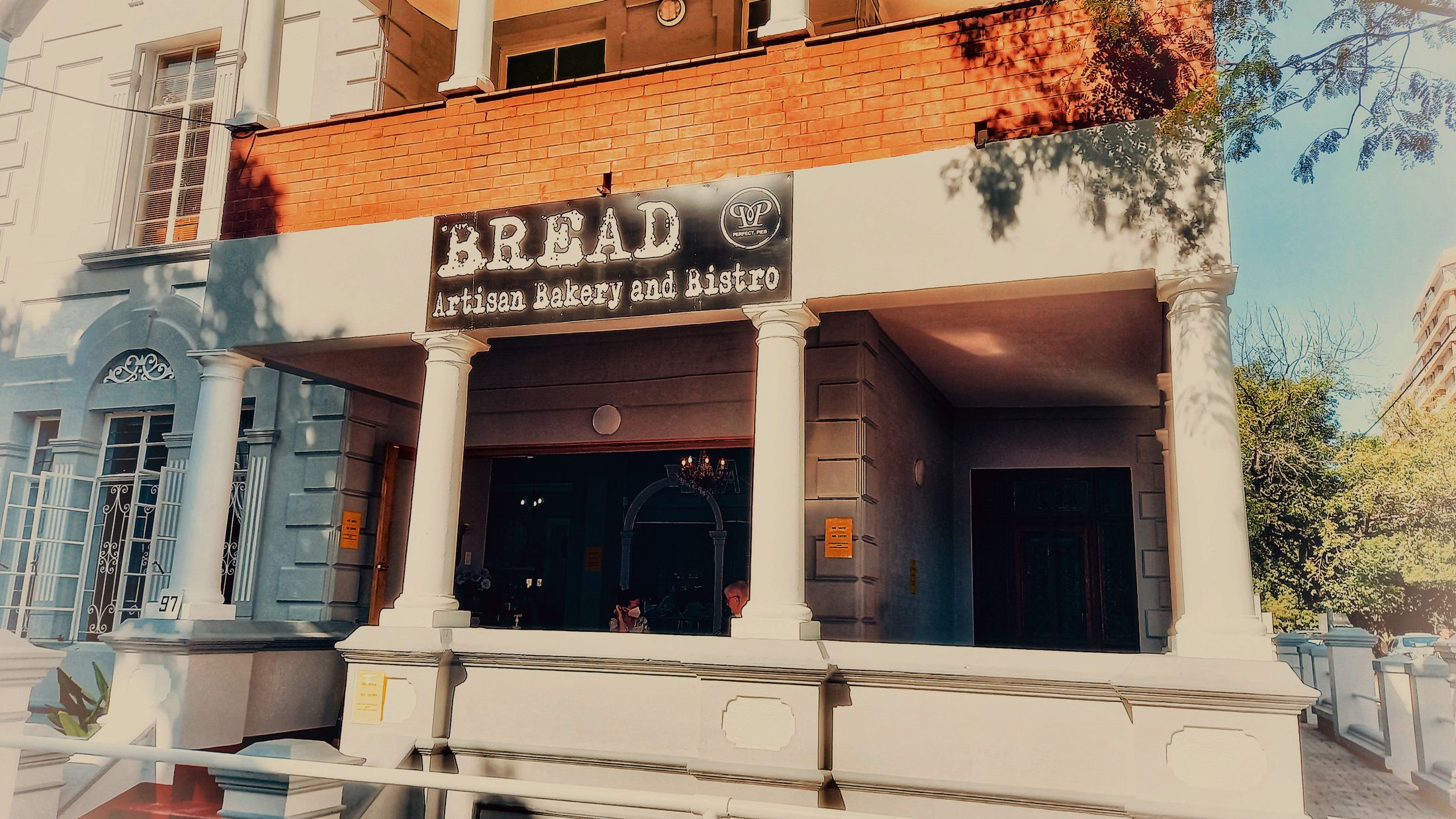
Peter Venter’s corner bakery: now bistro too. (Photo: Wanda Hennig)
Years before, he and Lucy had stayed in lower Morningside near the Windermere Centre. “There was a hairdresser in a little building that I loved. I saw a ‘To Let’ sign in the window.” And so the early version of Bread: The Artisan Bakery was born.
I ask him if there is any chef or baker he especially admires. There is one. “I think because he comes from a similar farm background.” Is also Afrikaans. “I feel I am on the same wavelength as Chef Jan Hendrik van der Westhuizen.” That is, South Africa’s French Riviera-based Michelin star chef.
Venter says what he especially likes is “how he takes something simple and makes it different. Exciting and unexpected. So, for example, he takes a meringue and hollows it out and you find sago pudding in it. And he makes an edible candle out of pork fat. You light it, it melts and you eat it with bread”.
It is the surprise element that speaks to him, he says. Which is how he likes to cook and bake. My baby marrow fritter has a surprise Moroccan infusion of Ras El Hanout. The surprise he experienced at age 16 with that first mille-feuille. The surprise of finding this unlikely breath of French air in Durban. DM/TGIFood
Follow Bread The Artisan Bakery on Facebook and on Instagram.





 Become an Insider
Become an Insider
Really appreciate the weekly updates on the Durban food scene Wanda. Plus all credit to the wonderful men and women with the guts to keep opening up new places.
Great article Wanda – love that place
Great! Will try it!